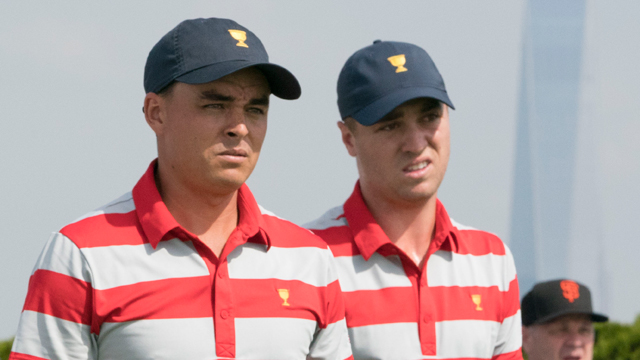NEWS
American golf sees a resurgence of youth

JERSEY CITY, N.J. (AP) -- A few generations before Jordan Spieth and Justin Thomas were even born, Ford Motor Co. put together a group of golfers known as the "Young Thunderbirds" to promote the rising stars on the PGA Tour.
"We played a lot of practice rounds together," said Johnny Miller, part of that group that included Lanny Wadkins, Jerry Heard, Jim Simon and Grier Jones. "You just push each other, and we separated ourselves from all the other young players."
What caused Miller to think back to the early 1970s was what he saw at East Lake for the Tour Championship, and what he will see this week at Liberty National for the Presidents Cup. The only difference was a car company promotion — and the size of the group.
Thomas won the FedEx Cup when he pulled away from Spieth over the final hour. They won the final two majors of the year. Both are 24 and have been close friends since they first met at a junior event in Texas that Spieth won 10 years ago.
RELATED: A closer look at the FedExCup's 11 champions since 2007
Xander Schauffele won the Tour Championship by saving par four times on the back nine and closing with a birdie. He ended his rookie season with two victories, though it was too late to be considered for the Presidents Cup. He turns 24 later this year and is — or was — an unheralded member of that fabled high school class of 2011.
"It's not just the three of us," Schauffele said. "I think I've always been on the outside looking in. You've got Justin, you've got Jordan, you've got Daniel Berger, you've got Emiliano Grillo. Hideki (Matsuyama) is also young. Jon Rahm is even younger than us. It's kind of weird being in their company. I said I got annoyed talking about them so much before, but yeah, they push me. And I can't thank them enough."
Complete records on the PGA Tour date to 1970, but this one was no less staggering. Players under the age of 25 won 18 times this season, shattering the previous mark of 10 set in 2000. And the previous record deserves an asterisk because Tiger Woods won nine of those events at age 24.
Throw in anyone in their 20s, and they accounted for 28 victories, or 58 percent of PGA Tour events.
The Presidents Cup features six players in their 20s on both teams. The Americans haven't been this stacked with youth since before these guys were born.
Woods was the only American in his 20s at the 2004 Ryder Cup and the 2005 Presidents Cup. Then he turned 30, and the Americans had no one in their 20s at The K Club in Ireland for the 2006 Ryder Cup.
The U.S. team at Liberty National has Spieth, Thomas, Berger, Brooks Koepka, Rickie Fowler and Patrick Reed.
"I think they're in pretty good shape in the future with those guys," Miller said.
That's how it was in 1998 at the Presidents Cup in Australia, when the first five qualifiers for that U.S. team — David Duval, Woods, Jim Furyk, Justin Leonard and Phil Mickelson — were all in their 20s. That figured to be the core of American golf for years to come, and it nearly was.
Duval lost his way through injury and confidence after his British Open title in 2001, while Leonard made the putt heard 'round the world at Brookline a year later until his team appearances became more inconsistent.
"It is such a young game right now," Thomas said Tuesday. "I was also thinking, 'Is it going to stay young?' We're going to be in our 30s at some point. But if we can keep playing well, stay competitive, keep pushing each other ... I feel like there's a good chance that all of us — at least four or five of us — will continue hopefully play on a lot of these teams for consecutive years.
"But there's going to a lot of others coming out of college who are going to want to take our place."
The relationships they have forged certainly help, and this goes beyond Instagram posts from their spring breaks.
Woods and Mickelson never hung out in the Bahamas, much less the locker room, unless they were playing a Ryder Cup or Presidents Cup. They also are about 5 years apart in age. Most of this generation grew up facing each other no matter where they were from because of how organized junior golf has become.
U.S. captain Steve Stricker can see this group a decade from now, at least a chunk of it. He knows as well as anyone that form can disappear. So can good health.
But it's the relationship he finds so intriguing.
"When one guy does something well, wins a tournament, it's almost a shot in the arm to another guy and he goes out and plays really well," Stricker said. "It's really cool, and a great outlook for USA team golf."
This article was written by Doug Ferguson from The Associated Press and was legally licensed through the NewsCred publisher network. Please direct all licensing questions to legal@newscred.com.
